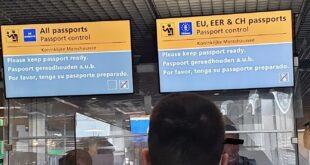Equal pay for equal work, new minimum wage for temporary workers, no more roaming charges and increased video surveillance. These and more are the changes to laws and regulations affecting consumers in Germany from June.
New minimum wage for temporary workers
(Neuer Mindestlohn für Leiharbeiter)
As from June, there is a mandatory minimum wage for temporary workers in Germany. It is 8.91 euros in the new federal states (East) and 9.23 euros in the old states (West). They’re around one million temporary workers in Germany.
Remuneration Transparency Law: equal pay for equal work
(Entgelttransparenzgesetz)
The Remuneration Transparency Law enters into effect on 1 June. The reason for the law are the reported differences in the earnings of men and women doing the same work. It will also be relevant in cases where workers with a migrant background are paid less than their German native colleagues. In companies with a minimum work force of 200, employees have the right to compare their remuneration with that of their colleagues. However, both must be performing a similar duty.
Analogue TV will be switched off
From 1 to 27 June, Germany’s cable operator Unitymedia will gradually switch off analogue cable television signal in the federal states of North-Rhine Westphalia, Hessen and Baden-Württemberg. Consumers who have analogue devices will need an additional receiver, a so-called digital cable tuner, to be able to continue to watch TV.
The digital television transition, also called the digital switchover, the analogue switch-off or the analogue shutdown, is the process in which analogue television broadcasting is converted to and replaced by digital television. This also involves analogue cable conversion to digital cable, as well as analogue to digital satellite television. The analogue switch-off is to make room for new digital channels, HD services and faster internet access.
Abolition of roaming charges for mobile users
As from 15 June 2017, mobile phone users in the 28 European Union member countries will be able to call, text and download data in another EU country as well as in Norway, Liechtenstein and Island for the same price they pay at home.
Every existing or new contract that includes roaming services will change to “roam like at home” contract under the new EU rules. Roaming costs will be eliminated for those travelling abroad for up to 90 days in one year, but not for a period longer than 30 days at a time.
The time limit is to ensure “fair use” of the system and prevent consumers from SIM shopping around the bloc to get cheaper deals, the European Commission says. “Roam like at home” is meant to make communicating while travelling easier. It is not intended to allow permanent roaming where a customer would take out a subscription in the cheapest possible country and use it to roam in his home country,” the Commission said. Mobile operators will monitor user data if they suspect customers are defrauding them, and will be allowed to apply a roaming “surcharge” to recoup any lost revenue.
Police use of body cams
The federal police can now use small, body-borne mobile cameras – the so-called body cams. The government says that experiences in individual federal states have shown that body cams help to curb violent attacks on policemen and women, but also members of the public should profit from the cameras as they will inhibit police behaviour.
Video surveillance will be expanded
The Federal Data Protection Act was amended already in May. The protection of people through video surveillance by private operators in public areas is now considered a “particularly important interest”. This will lead to an expansion of video surveillance in the country.
Stable prices for innovative medicines
The Act for the Strengthening of Drug Supply (Das Gesetz zur Stärkung der Arzneimittelversorgung or AMVSG) entered into force in May. It is intended to ensure that physicians can prescribe newly researched drugs and that patients benefit from medical progress.
New centre to examine authenticity of food
Does the olive oil come from Italy? Is the fish really a sole? These are questions that many consumers ask. The new Centre for Genuineness and Integrity in the Food Chain will further develop investigation methods, bundles and evaluates the results.
 THE AFRICAN COURIER. Reporting Africa and its Diaspora! The African Courier is an international magazine published in Germany to report on Africa and the Diaspora African experience. The first issue of the bimonthly magazine appeared on the newsstands on 15 February 1998. The African Courier is a communication forum for European-African political, economic and cultural exchanges, and a voice for Africa in Europe.
THE AFRICAN COURIER. Reporting Africa and its Diaspora! The African Courier is an international magazine published in Germany to report on Africa and the Diaspora African experience. The first issue of the bimonthly magazine appeared on the newsstands on 15 February 1998. The African Courier is a communication forum for European-African political, economic and cultural exchanges, and a voice for Africa in Europe.
































